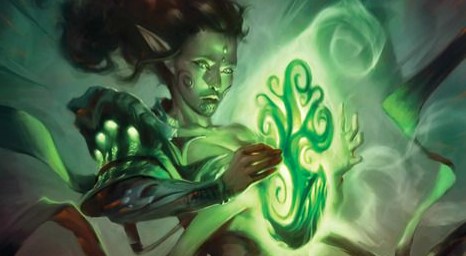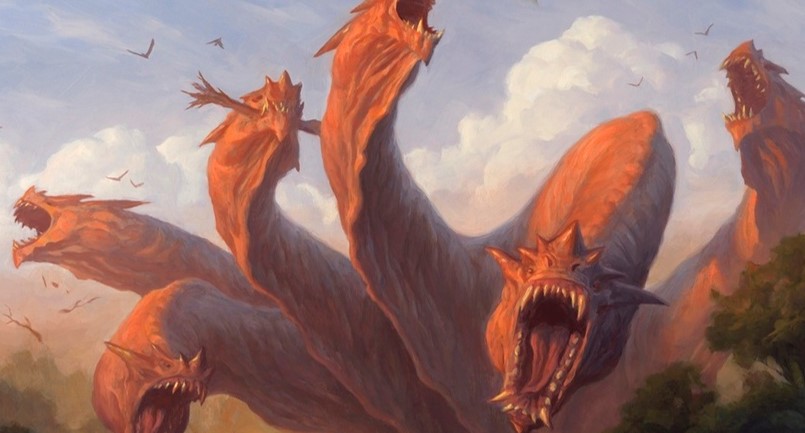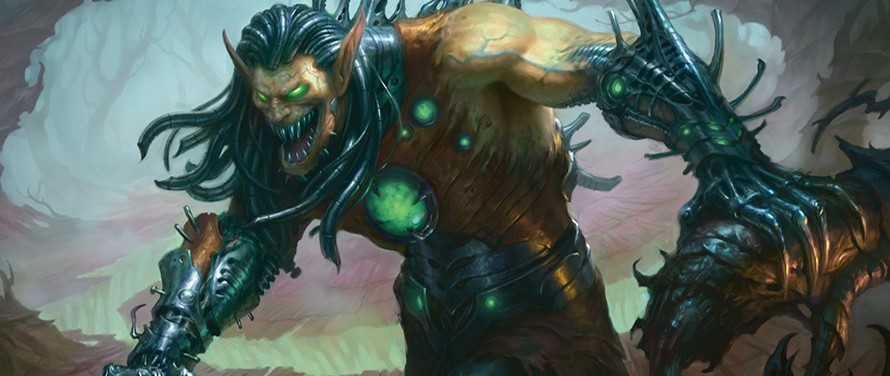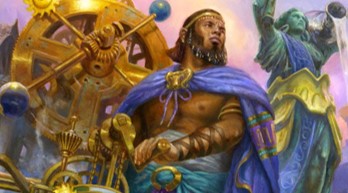(Ezuri, Claw of ProgressEzuri, Claw of Progress | James Ryman)
A Focus on Counter Magic
Hi everyone! Welcome back to The Knowledge Pool, where we take a deep dive on deep commanders!
Last year I presented my Kresh the BloodbraidedKresh the Bloodbraided deck, and I expressed my interest in counters as a way to build big creatures through synergistic interactions. You can find that article here. Kresh was a fun experiment, and the deck turned out to be more competitive than I imagined it would be, but recently I've wanted to try a counters strategy with a different flavor.
For years I've tinkered with the idea of a blue-green counters deck, bouncing between Experiment KrajExperiment Kraj and Ezuri, Claw of ProgressEzuri, Claw of Progress as potential commanders. I love the bizarre interactions that Kraj enables, but the steep casting cost makes the Ooze Mutant a tough sell. In contrast, Ezuri is a slightly more cost-efficient commander that enables a counters strategy more similar to Kresh. Ezuri and Kresh aim to achieve similar goals, but each approaches the game in a very different way: Kresh can only produce counters for himself, and he needs supporting effects to distribute those counters to other creatures, while Ezuri is the primary source of counters in the decks he helms. Fundamentally, Jund decks rely more heavily on sacrifice to achieve advantage, while creatures are far less expendable for a Simic counters strategy.
Ezuri's suite of abilities gives us several neat building restrictions, one of which is a focus on creatures with power two or less. Because Ezuri can place a lot of counters on to one creature, we also want to consider creatures that reward us when they have lot of counters or a high power and toughness. Making the most of Ezuri's synergies puts us in an awkward spot as deck builders: we want to maximize the number of experience counters we get, and this can be done most efficiently with token makers. However, tokens are some of the most unexciting targets for Ezuri's +1/+1 counters. My approach to this conundrum is to de-emphasize token generators in favor of more synergistic creatures. Experience counters are challenging to interact with and are maintained even when Ezuri dies. As long as we can cast a few cheap creatures while Ezuri is on board, we won't have to do as much work each successive time he's cast.
 Counter strategies have been bolstered with powerful payoff spells in recent years, especially in the Simic colors. We also have access to myriad ways to ramp and draw cards, and we even have a couple alternative win conditions that interact with counters. When possible, I've tried to select cards for this deck that reward our counter-heavy strategy, trading the high floor of many Commander staples for the high ceiling of synergistic options.
Counter strategies have been bolstered with powerful payoff spells in recent years, especially in the Simic colors. We also have access to myriad ways to ramp and draw cards, and we even have a couple alternative win conditions that interact with counters. When possible, I've tried to select cards for this deck that reward our counter-heavy strategy, trading the high floor of many Commander staples for the high ceiling of synergistic options.
You can find an interactive version of my deck here.
Ezuri, Claw of Progress
View on ArchidektCommander (1)
- 1 Ezuri, Claw of ProgressEzuri, Claw of Progress
Creatures (41)
- 1 Hangarback WalkerHangarback Walker
- 1 Walking BallistaWalking Ballista
- 1 Birds of ParadiseBirds of Paradise
- 1 Coiling OracleCoiling Oracle
- 1 Gyre SageGyre Sage
- 1 Hooded HydraHooded Hydra
- 1 Incubation DruidIncubation Druid
- 1 Sage of HoursSage of Hours
- 1 Sakura-Tribe ElderSakura-Tribe Elder
- 1 Scavenging OozeScavenging Ooze
- 1 Zameck GuildmageZameck Guildmage
- 1 Champion of LambholtChampion of Lambholt
- 1 Chasm SkulkerChasm Skulker
- 1 Eternal WitnessEternal Witness
- 1 Evolution SageEvolution Sage
- 1 FertilidFertilid
- 1 Marwyn, the NurturerMarwyn, the Nurturer
- 1 Pir, Imaginative RascalPir, Imaginative Rascal
- 1 Plaxcaster FroglingPlaxcaster Frogling
- 1 Reclamation SageReclamation Sage
- 1 Rishkar, Peema RenegadeRishkar, Peema Renegade
- 1 Sage of FablesSage of Fables
- 1 Simic ManipulatorSimic Manipulator
- 1 Vorel of the Hull CladeVorel of the Hull Clade
- 1 Beast WhispererBeast Whisperer
- 1 Fathom MageFathom Mage
- 1 Forgotten AncientForgotten Ancient
- 1 Glen Elendra ArchmageGlen Elendra Archmage
- 1 Herald of Secret StreamsHerald of Secret Streams
- 1 Master BiomancerMaster Biomancer
- 1 Spike WeaverSpike Weaver
- 1 Toothy, Imaginary FriendToothy, Imaginary Friend
- 1 Acidic SlimeAcidic Slime
- 1 Cultivator of BladesCultivator of Blades
- 1 Deepglow SkateDeepglow Skate
- 1 Kalonian HydraKalonian Hydra
- 1 MulldrifterMulldrifter
- 1 MycolothMycoloth
- 1 Bane of ProgressBane of Progress
- 1 Prime Speaker ZeganaPrime Speaker Zegana
- 1 Avenger of ZendikarAvenger of Zendikar
Instants (9)
- 1 Rapid HybridizationRapid Hybridization
- 1 Swan SongSwan Song
- 1 CounterspellCounterspell
- 1 Heroic InterventionHeroic Intervention
- 1 Reality ShiftReality Shift
- 1 ArachnogenesisArachnogenesis
- 1 Beast WithinBeast Within
- 1 Inspiring CallInspiring Call
- 1 Mystic ConfluenceMystic Confluence
Sorceries (5)
- 1 Curse of the SwineCurse of the Swine
- 1 Tezzeret's GambitTezzeret's Gambit
- 1 Flood of TearsFlood of Tears
- 1 Rishkar's ExpertiseRishkar's Expertise
- 1 Verdant ConfluenceVerdant Confluence
Artifacts (2)
- 1 Sol RingSol Ring
- 1 Swiftfoot BootsSwiftfoot Boots
Enchantments (3)
- 1 Hardened ScalesHardened Scales
- 1 Simic AscendancySimic Ascendancy
- 1 Hadana's ClimbHadana's Climb
Planeswalkers (1)
- 1 Nissa, Voice of ZendikarNissa, Voice of Zendikar
Lands (38)
- 1 Alchemist's RefugeAlchemist's Refuge
- 1 Blighted WoodlandBlighted Woodland
- 1 Blinkmoth NexusBlinkmoth Nexus
- 1 Breeding PoolBreeding Pool
- 1 Command TowerCommand Tower
- 1 Faerie ConclaveFaerie Conclave
- 1 Flooded GroveFlooded Grove
- 10 ForestForest
- 1 Hinterland HarborHinterland Harbor
- 9 IslandIsland
- 1 Karn's BastionKarn's Bastion
- 1 Khalni GardenKhalni Garden
- 1 Llanowar RebornLlanowar Reborn
- 1 Lumbering FallsLumbering Falls
- 1 Mosswort BridgeMosswort Bridge
- 1 Novijen, Heart of ProgressNovijen, Heart of Progress
- 1 Rogue's PassageRogue's Passage
- 1 Scavenger GroundsScavenger Grounds
- 1 Temple of MysteryTemple of Mystery
- 1 Yavimaya CoastYavimaya Coast
- 1 Zoetic CavernZoetic Cavern
The Breakdown
Our average converted cost for this deck is 3.21, and 42% of our spells cost between 2-4 mana. The glut of mid-range spells should come as no surprise given that we're opting for value creatures with power of two or less. We'll benefit from this density of 2-3 drops once we have Ezuri on board, and eventually we'll be able to cast two creatures in one turn for additional experience counters.
Lately I haven't been writing much about the ramp, draw, and removal I'm including in my decks. Normally these cards are staples of Commander, and don't warrant an entire entry of their own. For Ezuri, however, our draw and ramp spells can be highly synergistic; there are a lot of mana dorks whose potential for mana production increases with the number of counters on them. I tend to limit my inclusion of mana dorks in my decks for fear of losing production following a board wipe, but in this deck the reward is worth the risk. Our draw spells will take advantage of our strategy by turning counters into card advantage. Even better, many of our options to draw cards come in the form of low-power creatures to build up our experience counters.
Ezuri will be our primary source of counters, and I've sculpted this deck to take advantage of his abilities. That being said, I've included other options for generating counters in case Ezuri becomes prohibitively expensive. In addition to alternative counter sources, there are a handful of cards in this deck that will increase our counter output, including some that double the number of counters we place on our creatures. Given the interactions we've discussed so far, increasing our counter output will help us to draw more cards, make more mana, and, of course, hit harder.
 War of the Spark reintroduced one of the classic mechanics for adding counters, Proliferate, and offered several potent new toys. Proliferate is a little bit slow for our gameplan since we want to load up our creatures with a lot of counters all at once, but it should still be fairly impactful in a lot of situations. The fact that Proliferate allows us to increase our experience counters without playing more creatures is also a welcome boon.
War of the Spark reintroduced one of the classic mechanics for adding counters, Proliferate, and offered several potent new toys. Proliferate is a little bit slow for our gameplan since we want to load up our creatures with a lot of counters all at once, but it should still be fairly impactful in a lot of situations. The fact that Proliferate allows us to increase our experience counters without playing more creatures is also a welcome boon.
We'll be mostly eschewing a token-based strategy, but there are still a few token-makers that are too useful to ignore; these creatures can potentially lead to explosive plays if we can activate them with Ezuri on board.
A note on power level: Ezuri does not helm a fast deck, and I imagine many in the Commander community view him as clunky. I've built this deck to be effective in a somewhat slower meta comprised of 75% decks. I've seen Ezuri lists combo out in the early stages of the game, but combos are a limited portion of Ezuri's strategy. With our lack of tutors we shouldn't rely on our fragile combos, welcoming them on the rare occasions they're applicable.
Mutating a Monster
Ramp, Draw, and Protection
View on ArchidektRamp (8)
- 1 Birds of ParadiseBirds of Paradise
- 1 Sol RingSol Ring
- 1 Gyre SageGyre Sage
- 1 Incubation DruidIncubation Druid
- 1 Sakura-Tribe ElderSakura-Tribe Elder
- 1 FertilidFertilid
- 1 Marwyn, the NurturerMarwyn, the Nurturer
- 1 Verdant ConfluenceVerdant Confluence
Draw (10)
- 1 Coiling OracleCoiling Oracle
- 1 Sage of FablesSage of Fables
- 1 Inspiring CallInspiring Call
- 1 Beast WhispererBeast Whisperer
- 1 Fathom MageFathom Mage
- 1 Tezzeret's GambitTezzeret's Gambit
- 1 Toothy, Imaginary FriendToothy, Imaginary Friend
- 1 MulldrifterMulldrifter
- 1 Prime Speaker ZeganaPrime Speaker Zegana
- 1 Rishkar's ExpertiseRishkar's Expertise
Protection (6)
- 1 Heroic InterventionHeroic Intervention
- 1 Swiftfoot BootsSwiftfoot Boots
- 1 ArachnogenesisArachnogenesis
- 1 Inspiring CallInspiring Call
- 1 Plaxcaster FroglingPlaxcaster Frogling
- 1 Spike WeaverSpike Weaver
Starting our deep dive with our "glue" spells, we highlight a critical theme of our deck: all of our creatures have at least some utility, and the beauty of this strategy is that we can turn utility creatures into a game-winning threat. We don't have any creatures that are just beaters; they all have a role to play in progressing our strategy or disrupting our opponents'.
Starting with ramp, Gyre SageGyre Sage, Incubation DruidIncubation Druid, and Marwyn, the NurturerMarwyn, the Nurturer are three creatures begging for counters. Gyre Sage and Marwyn can produce a lot of mana after receiving Ezuri's blessing, and given that we have a single spell costing more than six mana, we'll be casting our "high-end" spells in no time. Incubation Druid can produce its own counters, but it does have a lower ceiling than its counterparts. What Druid lacks in potential, however, it makes up for with a high floor: if we can put a counter on Druid from anywhere, it can make us three blue or green mana.
FertilidFertilid is a classic creature for counter strategies, representing an excellent target for counters and a potent mana sink as the game goes on.
Moving on to draw spells, Sage of FablesSage of Fables, Fathom MageFathom Mage, and Toothy, Imaginary FriendToothy, Imaginary Friend will turn counters into card advantage. Sage of Fables is a mana sink that will let us strip counters from any of our creatures to draw cards, while Fathom Mage and Toothy thrive as more counters are placed on them. Luckily, Toothy has a "leaves the battlefield" trigger, so there will be few instances where we can't cash in on our counters.
 Just because Rishkar's ExpertiseRishkar's Expertise and Prime Speaker ZeganaPrime Speaker Zegana don't say the word "counters" doesn't mean they won't reward us for building giant monsters with Ezuri.
Just because Rishkar's ExpertiseRishkar's Expertise and Prime Speaker ZeganaPrime Speaker Zegana don't say the word "counters" doesn't mean they won't reward us for building giant monsters with Ezuri.
I rarely have sections devoted entirely to protection spells, but there are a surprising number of excellent options that play well with counter strategies. FogFogs aren't often given enough respect in Commander, but as a player with Karador, Ghost ChieftainKarador, Ghost Chieftain and Meren of Clan Nel TothMeren of Clan Nel Toth decks, my opponents hate when I can establish a Spore FrogSpore Frog. In Ezuri, Spike WeaverSpike Weaver is our Spore Frog, making us completely unappealing as an attack target. In addition to Spike Weaver, we're also running ArachnogenesisArachnogenesis, which can neutralize a lethal attack while generating experience counters with Ezuri.
Plaxcaster FroglingPlaxcaster Frogling is a card I didn't appreciate until it was played against me: Graft allows it to distribute counters, and once our creatures have counters, we just need to hold up a couple mana to make them impervious to spot removal.
The last spell I want to highlight is wrath protection in the form of Inspiring CallInspiring Call, which will protect our board, doubling as a draw spell.
The Source of Progress
Counters and Synergies
View on Archidekt- 1 Hardened ScalesHardened Scales
- 1 Zameck GuildmageZameck Guildmage
- 1 Evolution SageEvolution Sage
- 1 Hadana's ClimbHadana's Climb
- 1 Nissa, Voice of ZendikarNissa, Voice of Zendikar
- 1 Pir, Imaginative RascalPir, Imaginative Rascal
- 1 Rishkar, Peema RenegadeRishkar, Peema Renegade
- 1 Vorel of the Hull CladeVorel of the Hull Clade
- 1 Forgotten AncientForgotten Ancient
- 1 Master BiomancerMaster Biomancer
- 1 Deepglow SkateDeepglow Skate
- 1 Kalonian HydraKalonian Hydra
Our deck is counter-centric so we'll want to have options for increasing our counter output. Cards like Hardened ScalesHardened Scales and Pir, Imaginative RascalPir, Imaginative Rascal will enhance every instance of counter production, while Vorel of the Hull CladeVorel of the Hull Clade, Kalonian HydraKalonian Hydra, and Deepglow SkateDeepglow Skate will let us double the counters on our most threatening creatures.
Master BiomancerMaster Biomancer and Zameck GuildmageZameck Guildmage give us the opportunity to pump our creatures as they enter play, and Biomancer is a favorite of mine in this deck for the number of different cards it interacts with: not only will Biomancer net us an additional experience counter when they enter play, they'll also benefit our team mightily once targeted by Ezuri.
A lot of spells distribute single counters, and the few I've included offer impressive utility. Nissa, Voice of ZendikarNissa, Voice of Zendikar was excellent in my Kresh deck, and she's even better in this one. Her plus ability makes her one of our few token generators, and a free trigger for Ezuri each turn, while her minus is a counter-based anthem that will offer extra value once we've established a board presence.
We'll be able to flip Hadana's ClimbHadana's Climb quickly in this deck, making it a three mana ramp spell that will grant our biggest creature a power boost and evasion.
No Hoof Required
Aggro and Combos
View on Archidekt- 1 Sage of HoursSage of Hours
- 1 Simic AscendancySimic Ascendancy
- 1 Champion of LambholtChampion of Lambholt
- 1 Herald of Secret StreamsHerald of Secret Streams
- 1 Cultivator of BladesCultivator of Blades
Once we've mutated a handful of creatures, we'll need reliable ways to help them deal damage; even the biggest creature Ezuri makes can be blocked by a lowly token, but these cards will ensure that nothing's getting in our way.
Champion of LambholtChampion of Lambholt will grow with each creature we cast, and each counter on Champion will make the rest of our team harder to block. In most cases, targeting Champion with Ezuri will make our creatures untouchable. Similarly, Herald of Secret StreamsHerald of Secret Streams will offer a similar utility, making each creature Ezuri targets evasive.
The few token-makers I've included will tend to make a lot of bodies all at once. While we'll benefit in the form of experience counters, the tokens themselves won't be very threatening. However, Cultivator of BladesCultivator of Blades will make all of our creatures, even the tokens, frighteningly powerful. Cultivator is an excellent target for Ezuri, and as long as we can keep them alive long enough to attack, we'll be able to pump are creatures enough to put Craterhoof BehemothCraterhoof Behemoth to shame.
When all else fails, we want to have a few alternative routes to victory: Simic AscendancySimic Ascendancy and Sage of HoursSage of Hours. Once we have five experience counters, Sage of Hours and Ezuri will enable us to take infinite turns. Simic Ascendancy will trigger with each counter we distribute, making it potent with both Ezuri and our counter-doublers, and we should quickly reach 20 growth counters on Ascendancy to win the game.
Obviously, both of our potential combos are fragile and easily disrupted by removal, but in the right situation we might be able to steal a game that seemed out of reach.
The Cut List
Among the new cards released recently, Thought SpongeThought Sponge fills a similar role as Toothy, Imaginary FriendToothy, Imaginary Friend, and flash makes it a tempting inclusion. However, the Partner interaction between Pir, Imaginative RascalPir, Imaginative Rascal and Toothy, plus Toothy's "leaves the battlefield" trigger, make it more appealing to me.
Sword of Truth and JusticeSword of Truth and Justice, Contagion EngineContagion Engine, and Inexorable TideInexorable Tide could represent consistent source of Proliferate triggers, but as mentioned previously, I think there are generally more impactful ways for us to put counters on creatures.
A lot of counter decks will run Doubling SeasonDoubling Season on principle, but in this instance I don't think the expensive monetary cost is a worthy investment for my version of the deck. If you decide to skew this deck more heavily in favor of tokens, Doubling Season may need another look.
Wrapping Up
Thank you all for taking the time to read my article! Lately I've been brewing a lot of dual color decks, but the recent spoilers from Throne of Eldraine may have me building a three-color or mono-color deck in the near future.
Until next time, I wish you all the best and happy brewing!
Scot Sutton
I'm a Timmy that loves Green, Creatures, and Lands. I prefer controlled smashing, and best associate with the Temur colors. I've been playing commander since 2012, and I spend my free time brewing decks and exploring new strategies. I'm also a sports nut, and follow baseball, football, hockey, and soccer in detail.
Your opinions are welcome. We love hearing what you think about Magic! We ask that you are always respectful when commenting. Please keep in mind how your comments could be interpreted by others. Personal attacks on our writers or other commenters will not be tolerated. Your comments may be removed if your language could be interpreted as aggressive or disrespectful. You may also be banned from writing further comments.

